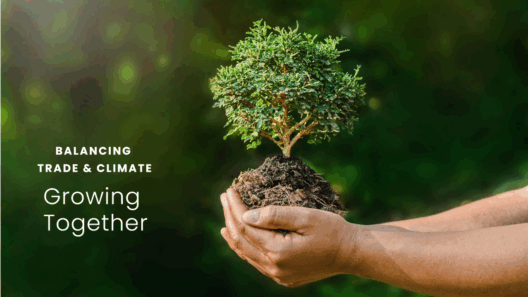Climate change is no longer a distant threat lurking on the horizon; it is an impending reality that is reshaping our economies and societies. As the Earth warms, we are compelled to confront an essential question: What are the economic consequences beyond mere financial bottom lines? Are we willing to challenge the status quo and comprehend the full spectrum of repercussions stemming from climate change? This inquiry transcends mere curiosity; it beckons us to navigate through the intricate relationship between environmental health and economic stability.
The warming planet catalyzes a complex cascade of economic challenges. First and foremost, we witness an increase in extreme weather events. Hurricanes, droughts, and floods have become alarmingly ubiquitous, causing extensive damage to infrastructure and the agricultural sector. The financial burden of natural disasters can be monumental. For example, the aftermath of Hurricane Katrina wrought approximately $125 billion in damages. This figure is merely a microcosm of the larger narrative that reveals climate change as a silent but potent force eroding financial stability.
Consider agriculture, the backbone of many economies. Rising temperatures disrupt growing seasons and diminish crop yields. According to agricultural studies, a mere increase of 1°C can lead to a significant decline in staple crops. This phenomenon not only threatens food security but also elevates prices in the marketplace, affecting both consumers and producers. Farmers, particularly in developing regions, may find themselves grappling with the dual challenges of erratic weather patterns and rising costs, resulting in escalating levels of poverty.
Moreover, the economic fallout finds roots in the health sector. As temperatures rise, so too do health-related expenditures. Increasing cases of heat-related illnesses, respiratory disorders from poor air quality, and vector-borne diseases, such as malaria and dengue fever, place a growing burden on healthcare systems. The Centers for Disease Control and Prevention (CDC) has projected substantial increases in health costs as a direct consequence of climate change. These expenses may siphon funds away from essential services and infrastructure, further compounding economic vulnerabilities.
In the realm of insurance, the paradigm is shifting. Insurers are recalibrating their risk models in response to escalating climate-related threats. The frequency of claims resulting from climate-induced damage necessitates price hikes or, in some cases, the withdrawal of coverage altogether. This is particularly evident in regions prone to flooding or wildfires. With an increase in premiums, homeowners may find it challenging to maintain sufficient coverage, thereby exacerbating financial instability.
Moreover, transitioning to renewable energy sources presents both opportunities and challenges. While the shift away from fossil fuels is imperative for environmental sustainability, the transition comes with economic costs, including job displacements in traditional energy sectors. However, this presents us with a potential challenge: Can we mold educational and vocational programs to facilitate a seamless transition for workers affected by this change? The potential to harness innovation and entrepreneurship in the renewable sector can foster economic resilience.
On a macroeconomic level, climate change poses a jeopardy to global GDP. A study by economists posited that unchecked climate change could lead to a reduction of up to 7% in global GDP by 2100. This alarming projection illumes the urgency of implementing robust climate policies. Disturbingly, economies that are heavily reliant on climate-sensitive sectors may experience disproportionate repercussions, thereby deepening global inequality. The challenge remains: How can we ensure that economic growth in the future is both inclusive and sustainable?
Investment in green technology offers a silver lining amidst these threats. The transition to a low-carbon economy can catalyze economic growth by creating jobs, fostering innovation, and reducing dependency on finite resources. Countries that embrace sustainable practices in manufacturing, transportation, and energy generation may find themselves at a competitive advantage in the global marketplace. As we ponder this proposition, one must ask: Are we equipped to innovate and invest in the solutions that will secure our economic future?
Additionally, the interconnectedness of global supply chains further exacerbates the economic vulnerabilities linked to climate change. Disruptions in one region can reverberate across the globe, affecting international trade and market stability. As production shifts due to extreme weather impacts, businesses may scramble to adapt, leading to heightened costs for consumers. The flexibility of supply chains must be evaluated to ensure resilience in the face of environmental upheavals.
In tandem with these economic insights, an often-overlooked element is the psychological impact of climate change on consumption behavior. As consumers become increasingly aware of environmental issues, their purchasing decisions may pivot towards sustainable products and practices. This behavioral shift can yield economic opportunities for businesses that align with these changing consumer values. The pertinent question arises: Are businesses ready to embrace sustainability as a core component of their strategic vision?
Ultimately, the broader economic consequences of a warming planet require a multifaceted approach that integrates environmental science, economics, and social equity. The dialogue must transcend simplistic measures of profit and loss to embrace the interconnectedness of ecological health and economic viability. It beckons policymakers, businesses, and civil society to collaborate and innovate for a resilient future. As we stand on the precipice of ecological and economic transformation, the imperative is clear: adapt or face the unfavorable economic repercussions of inaction.
Indeed, confronting climate change requires us to embrace not only the challenges it brings but also the potential for innovation, resilience, and collective action. The consequences of a warming planet demand informed discussions and pragmatic solutions that will shape our economic narrative for generations to come. To foster a sustainable future, we must venture beyond the bottom line—an endeavor fraught with complexity but essential for the vitality of our planet and economies.







